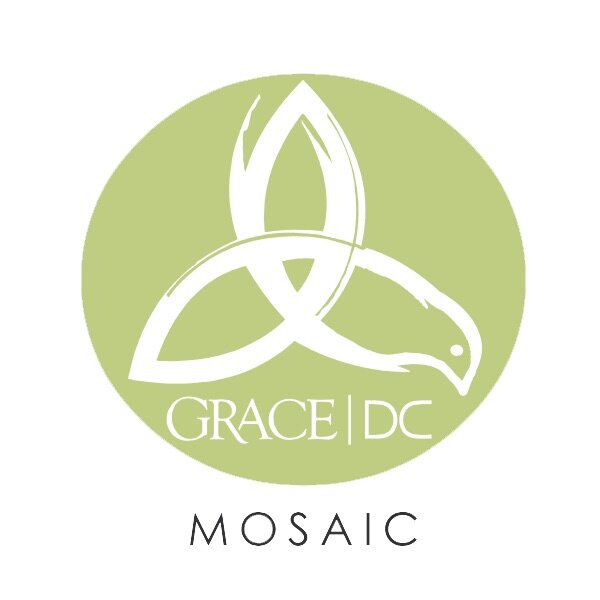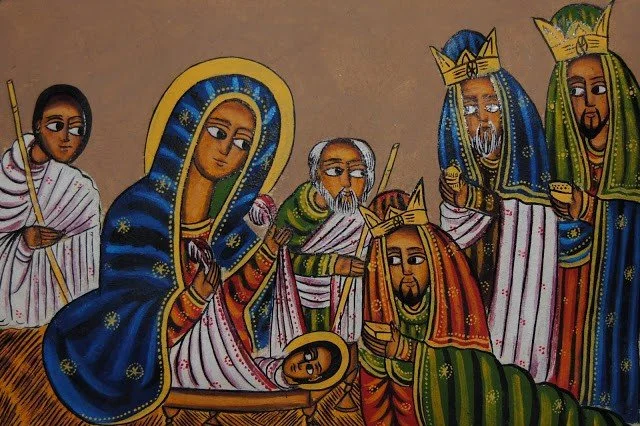The People of the Gift
The Three Kings II by an unknown Ethiopian artist.
Meditation
The story that Christianity tells is a story that is at once rooted in and consummate in a gift. It begins as the Trinity, in an overflow of love, gives the gift of the world. “All this I give you,” God says (Gen. 1:29). And it ends as the Trinity, in an ingathering of love, gives the gift of re-creation. “Behold, I make all things new” (Rev. 21:5).
And between this gratuitous beginning and ending, there are—like little packages on our doorsteps—gifts scattered along the way. Forgiveness and clothing to Adam and Eve, a son to the aged Abraham and Sarah, food to the famished sons of Jacob, strength to the stammering Moses, water from the rock to the thirsting Israelites, strength to the young David, wholeness to the broken Job, and the promise of home to an exiled people. Each of these, each of them, gifts from the very hand of God to creatures in need.
But above all, there is the most miraculous of God’s gifts: the gift of himself in Jesus. Jesus, who is the gift: announced by angels, nurtured by a young girl, marveled over by shepherds, received by the brokenhearted. Jesus who gives the gift: the gift of faithfulness in the wilderness, the gift of calling to the fishermen, the gift of bread and fish to the hungry, the gift of sight to the blind, the gift of compassion to the cast off, the gift of crucifixion to the sinner, the gift of resurrection to the doomed, the gift of bread and wine to the pilgrim, and the gift of assurance to the weary. And, perhaps most mysteriously, Jesus who receives the gift: the gift of milk from his mother’s breast; the gifts of gold, frankincense, and myrrh from the magi (gifts not simply of worship, but of support for a poor family); the gift of blessing from Simeon; the gift of food from a boy; the gift of perfumed tears from a woman; the gift of cross-bearing from Simon of Cyrene; the gift of a tomb from Joseph; the gift of burial spices from
Mary. The mystery of mysteries—this One who gives all things, himself gladly receives from our own fragile hands. Alleluia.
Naturally, this story of the gift creates a people of a gift. Having received, we give. Indeed, the act of giving is one of the fundamentally definitional acts of the Christian church. And while this giving takes many shapes, one of the most traditional and consistent is that of the giving of alms. It’s a strange word, “alms,” one not often used today in our circles. Even so, the work of alms, which (in Greek) simply means “mercy,” is—and always has been—at the heart of what it means to live as the people of God in the world.
Indeed, from the earliest days of the church in the Roman Empire, this work—the work of merciful giving to others— was seen as one of the most peculiar (and most dangerous) aspects of the Christian community. And throughout history, this act of giving has been both the source of good for our neighbors (providing food, shelter, medical care, and education to millions of people) and the essential validation of our witness. And correlatively, our failure to give—and our choice to hoard instead—has been one of the greatest hindrances to both the flourishing of our neighbors and the credibility of our message.
This historical truth is, perhaps, more relevant than ever in our own contemporary moment. After all, we live in the time of the greatest income inequality in the history of the world, a time when millions and millions of our fellow human beings do not have the resources necessary to create the conditions of well-being for either themselves or their children. And this situation has only been exacerbated by the COVID-19 pandemic, an event that has brought profound and lasting economic devastation to people all over the world. In this time it is deeply important that the Christian church make a clear, sacrificial, and sustained return to the practice of giving alms. For in this way, not only will we become a gift to our neighbors, we will also bear witness—concrete and material witness—to the Triune giving heart that stands at the heart of the world.
Exploration
Take Stock. What have you received from God your provider? Take stock of your money, possessions, and time. Count the sum of it and be able to articulate how much it is.
Release. Out of that total of what God has given you, prayerfully discern with your community what ought to be given up for the good of others (and for your own good). Release those things, trusting in the eternal abundance found in the kingdom of God.
Enjoy. Jesus said, “It is more blessed to give than to receive” (Acts 20:35). That word “blessed” can also be rendered “happy.” It is a deep joy to give, much more so than to gather for ourselves, for it is there that we experience the heart of Jesus.
Take Stock. Release. Enjoy.
Gregory Thompson (PhD, University of Virginia) is a pastor, scholar, artist, and producer whose work focuses on race and equity in the United States. He is the co-creator of Union: The Musical, a soul-and hip-hop-based musical about the 1968 Sanitation Workers’ Strike, and the co-author Reparations: A Christian Call to Repentance and Repair (Brazos, 2021).

